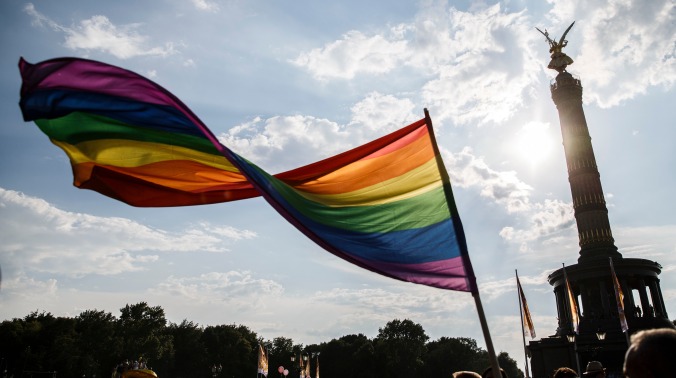Strangest fact: Ulrichs came up with his own words for “gay.” In his first five essays, collected as Studies On The Riddle Of Male-Male Love (we assume it flows better in the original German), he coins the word “urning” and “urningin” for gay men and women, respectively, and “dioning” and “dioningin” for straight people. The words are derived from Aphrodite, the Greek goddess of love. In mythology, she had two sides—Aphrodite Urania, who was “born from the severed genitals of Uranus,” and therefore had no mother, and Aphrodite Pandemos, the daughter of Zeus and Dione’s heterosexual pairing. Plato had previously used the two Aphrodites symbolically in Symposium, to describe love based on sexual gratification and love based on mutual respect (although in Plato’s writing, either kind of love could be directed at either gender).
Thing we were happiest to learn: The moral and legal argument for gay rights arrived fully formed. Written in the 1870s, the arguments in “Araxes: A Call To Free The Nature Of The Urning From Penal Law” are surprisingly modern. Ulrichs lays out the case for gay rights, personhood, and citizenship by arguing that homosexuality exists in nature and cannot simply be legislated away, and that “the prohibition of the expression of the sex drive, i.e., between consenting adults in private, lies outside the legal sphere,” virtually the same argument the U.S. Supreme Court used in deciding Lawrence v. Texas 133 years later. His argument that “just because Urnings are unfortunate enough to be a small minority, no damage can be done to their inalienable rights” mirrors the Court’s ruling in Obergefell v. Hodges, the decision that established marriage equality, in which the majority wrote that there wasn’t “sufficient justification for excluding the relevant class from the right [to marry].”
Thing we were unhappiest to learn: As you would expect, Ulrichs’ ideas received quite a lot of pushback from his contemporaries. He spent much of the 1850s as a district court lawyer for the Kingdom Of Hanover, but was fired for being gay. In 1867, he was the first person in the modern era to speak out publicly for gay rights when he addressed the Congress of German Jurists, asking them to repeal laws banning homosexuality, but he was actually shouted down by the jurists. He continued to publish throughout the rest of his life, but usually at his own expense. His gravestone claims he died an “Exile and Pauper,” though Wikipedia suggests “pauper” is an exaggeration. In any case, he was largely forgotten until the gay rights movement took a renewed interest in his work in the late 1980s, and there are now streets named after him in Berlin, Munich, Hanover, and Bremen.
Best link to elsewhere on Wikipedia: While Ulrichs’ writing on gay rights is his most important work, he wrote on a variety of subjects, in German and Latin. Among other things, he wrote a dissertation on the Peace of Westphalia, a monumental 1648 peace treaty that ended both the Thirty Years’ War in the Holy Roman Empire and the Eighty Years’ War, the Netherlands’ war of independence from Spain. Westphalia ended an era of brutal Catholic-Protestant infighting, and created a model of European stability that may have paved the way for colonialism.
Further down the Wormhole: Once Ulrichs’ writings were rediscovered in the 1980s, he was widely recognized as a forefather of LGBT social movements. While the 1969 Stonewall Riots are widely considered the starting point for the American LGBTQ rights movement, queer individuals fought for rights and visibility long before. The Ladder, the country’s first lesbian-themed magazine began publishing in 1956, and was one of the only publications that even acknowledged lesbians’ existence, apart from pulp fiction, which, while intended to be salacious, also provided lesbian visibility to readers of the 1950s and ’60s. We’ll take a look next week.

